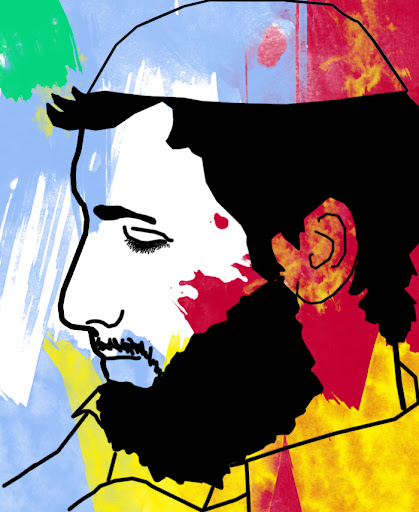I imagine every yeshivah has its share of weirdos - misfits, lunatics, the homeless - or all three - who hang around. It seems like a very logical and rather symbiotic relationship when one thinks about it. After all, Yeshivah bochurim - who ostensibly dedicate their entire day to Torah study - are always on the prowl for some easy entertainment. Debating with, harassing and conversing with odd people makes for a great way to kill time - both during the event and at bull sessions for days after.
The misfit also gains from the relationship. Lonely and in need of attention, the bochurim provide a listening ear and youthful energy. The yeshivah also often comes with free food and a home away from home.
If the above isn't true in all yeshivos - it most definitely was in Los Angeles. During my high-school years we came to know a diverse cast of characters: There was Shua Ed, the every learning and davening man who lived behind the mikvah - and was rumored to have suffered a nervous break down, now living off of his wealthy sisters funds. We had Danny, the Baal teshuvah chasid who clinged to every kind of chasidus and mumbled constantly to himself. There was Chaim Shlomo, the high-school math teacher who, after blowing his brain out with drugs, returned to the school he had taught math in over two decades before. The list went on and on . . .
And then there were rumors of characters past - there was the Chacham Bashi (or something like that) a Persian man who showed up in the 80's . . . and there was Rick.
Rick was rumored to have been a homosexual adult-actor who, some years after retiring, spent his time watching the bochurim and dressing in chasidic garb. Apparently, before dying of AIDS he had written a book about his experience living across the street from a yeshivah - our yeshivah.
The Boys Across the Street is that book.
It is odd, repetitive work that - when understood fully - is truly quiet frightening. After all, Rick's yearning to bed the Yeshivah boys, to teach them 'what he knows' is nothing short of pedophilia.
Yet, despite it's truly disturbing implications, the book itself isn't vicious. It's actually quiet soft and caring in its narrations - the people observed by rick are all treated with a certain affection.
While the back of the book lists it as a work of fiction with only semi-autobiographical over-tones- I am quiet sure it is very real. Names and dates match up - my friends and neighbors, as very small children, make appearances throughout the book.
Rick Sandford writes what he experienced when observing the Yeshivah . . . and there in lies my fascination with the book.
At face value, The Boys Across the Street is a rather frustrating book.
In a series of vignettes or sketches, Rick recounts his meetings with the boys across the street. They, as heterosexual, religious and cloistered individuals fascinate him. Rick, as a homosexual, atheist outsider fascinates them. The bochurim are believers, Rick is hedonist. He wishes he was never born. They mince words, they disagree. They form fleeting friendships and end them. The process repeats itself perhaps a dozen times then - just as Rick begins to come to the faintest hint of something deeper in life - the book ends.
At best it serves an absurdest parable - bringing to opposing worlds together, only to repeat the process again.
Yet I was captivated...
Rick's observations so clearly captured my yeshivah years - the dorm, the park we played in, the neighborhood, and the craziness of West Hollywood. He picks up on the Messianic fervor of 91-92. He notes the Crown Heights Riots . . . it's a time capsule.
Can I recommend the book to others? Despite a certain degree of tenderness Rick may show - he's coarse and crude. He feels the boys won't let him into their lives because he is an Atheist (unlikely) non-Jew (more likely), and gay (possibly). The book meanders and repeats itself . . .
But for those who went to YOEC . . . nothing catches the place (at least in the good old days) better.
(Image: Good Reads)
10 months ago


5 comments:
Refreshing to hear about people mincing words. All you ever hear about these days is people not mincing words!
http://www.newyorker.com/archive/1994/07/25/1994_07_25_082_TNY_CARDS_000367745
Hmm, I remember hearing about this book.
Lonely and in need of attention, the bochurim provide a listening ear and youthful energy.
Who is lonely and in need of attention?
"He feels the boys won't let him into their lives because he is an Atheist (unlikely) non-Jew (more likely), and gay (possibly)."
So why didn't he just go to a Lubavitcher yeshiva?
Seeing uptick in CA's interest in dangling modifiers, reader wonders whether said blogger will also become more interested in proper use of articles in English language.
Post a Comment